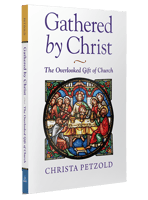For some of us, church is a word that stirs painful memories, which keep us away from the pews on Sunday morning. Others of us go to church each week and shake our heads sadly at the sight of empty pews, mourning for those people we no longer see in them. For those of us who love the Church and are committed to a life lived as part of the Body of Christ, we can still struggle daily with trusting the future of the Church to the Holy Spirit.
The Struggle of the Church
Because of our sinful nature, humans are self-centered. Apart from the revelation of God’s Word and the work of His Spirit in our hearts, we are disposed to see things through our own lens. We have negative experiences of church, and we draw the conclusion that church causes more harm than good. We hear of clergy abuse scandals, and we infer that the pastoral office cannot be trusted. We fail to perceive a difference in ourselves after we receive the body and blood of Jesus in Holy Communion, so we assume that it makes little difference how often we bring ourselves to an “in person” church service. We trust our own perceptions of what the Church is over what Jesus tells us about His Bride through the words of Scripture.
During the Church Year, the Day of Pentecost is a day to remember and celebrate the gift of the Holy Spirit and the beginnings of the Christian Church. But of course the story of God’s people goes all the way back to Adam and Eve. From God’s promise of a Savior after the fall into sin to the calls of Noah and Abraham to the deliverance of the Israelites from slavery in Egypt, the theme of God calling His people and making them holy echoes throughout the Bible. This is the same call God gives to and through the Church today—a call for God’s people to be set apart, sanctified by the Spirit, made holy by Him and for Him.
The task of the Church may appear daunting. It is easy to look around the world and see the Church as losing the fight. It can be tempting to worry about demographic shifts or place our hope in new strategies, innovative programs, or charismatic leaders. Or we may be tempted to shake off anything “institutional” and attempt to pursue our faith on our own, apart from the gathering of God’s people. But in Scripture we read:
Has not God made foolish the wisdom of the world? … but we preach Christ crucified, a stumbling block to Jews and folly to Gentiles, but to those who are called, both Jews and Greeks, Christ the power of God and the wisdom of God. For the foolishness of God is wiser than men, and the weakness of God is stronger than men. (1 Corinthians 1:20–25)
What we see as foolish, God sees as wise. What we see as a man dying on a cross, God sees as the ultimate victory over sin, death, and the devil. God sees things rightly; our vision is fallible. We must learn to see the Church through God’s lens as well, rather than through our own. But how can we do this? We cannot do it alone.
The Helper of the Church
After Jesus rose from the dead, He told His disciples, “Behold, I am sending the promise of My Father upon you. But stay in the city until you are clothed with power from on high” (Luke 24:49). Rather than give His disciples specific instructions for their first steps in growing the Church, Jesus tells them to sit still and wait. Do nothing. In John 15:26, Jesus describes the Holy Spirit as “the Helper,” sent by the Father, and “the Spirit of truth.” Without the Holy Spirit, there is no Church. And Jesus is the one who will build the Church (see Matthew 16:18).
There is a reason why we confess our belief “in the Holy Spirit” adjacent to our belief in “the holy Christian Church” when we say the Creed. The work of the Holy Spirit is centered in the life of the Church. In his Large Catechism, Luther describes the purpose of the Church this way:
Everything, therefore, in the Christian Church is ordered toward this goal: we shall daily receive in the Church nothing but the forgiveness of sin through the Word and signs, to comfort and encourage our consciences as long as we live here. So even though we have sins, the <grace of the> Holy Spirit does not allow them to harm us. For we are in the Christian Church, where there is nothing but <continuous, uninterrupted> forgiveness of sin. This is because God forgives us and because we forgive, bear with, and help one another [Galatians 6:1–2]. (LC, II 55)
The Church exists for the purpose of forgiving sins: the first thing that happens after the Holy Spirit arrives at Pentecost is a sermon of repentance. Peter preaches to the crowds, “Repent and be baptized every one of you in the name of Jesus Christ for the forgiveness of your sins, and you will receive the gift of the Holy Spirit” (Acts 2:38). Luther understood that the purpose of the Church is to connect us each as individuals to Christ’s Body and to the promise of salvation. We are not alone in this world. Jesus has promised, “I am with you always, to the end of the age” (Matthew 28:20), and the way He is with us now is through His Body, the Church.
The Church as Jesus’ Bride
It is easy for us to see the sins of the church, but when we see the Church through Jesus’ eyes, we see that those sins are covered with Jesus’ righteousness. His love and sanctifying care covers her blemishes. Jesus sees the Church as His Bride: cherished, righteous, made holy by Him.
Husbands, love your wives, as Christ loved the church and gave Himself up for her, that He might sanctify her, having cleansed her by the washing of water with the word, so that He might present the church to Himself in splendor, without spot or wrinkle or any such thing, that she might be holy and without blemish. In the same way husbands should love their wives as their own bodies. He who loves his wife loves himself. For no one ever hated his own flesh, but nourishes and cherishes it, just as Christ does the church, because we are members of His body. (Ephesians 5:25–30)
Through the Church, Jesus gives each of us His gifts: the gift of the Word of God, purely preached; the gift of forgiveness through the waters of Baptism and through His body and blood received in holy Communion; and the gift of a hope to share with the world. On Pentecost, we see all of these gifts, poured out by the work of the Holy Spirit. Peter preaches the Word of God, people repent and receive forgiveness and faith in Baptism, and the supernatural proclamation of the Gospel in many languages demonstrates the universal mission of the Church. It is through these gifts, given to and stewarded by the Church, that Jesus promises to meet you today, right where you are, with His grace and forgiveness.
Scripture: ESV®.
Quotation marked LC is from Concordia: The Lutheran Confessions, second edition © 2006 CPH. All rights reserved. Brackets from Concordia.

Read more about the gifts God gives His Church and community of believers in Christa's book, Gathered by Christ












